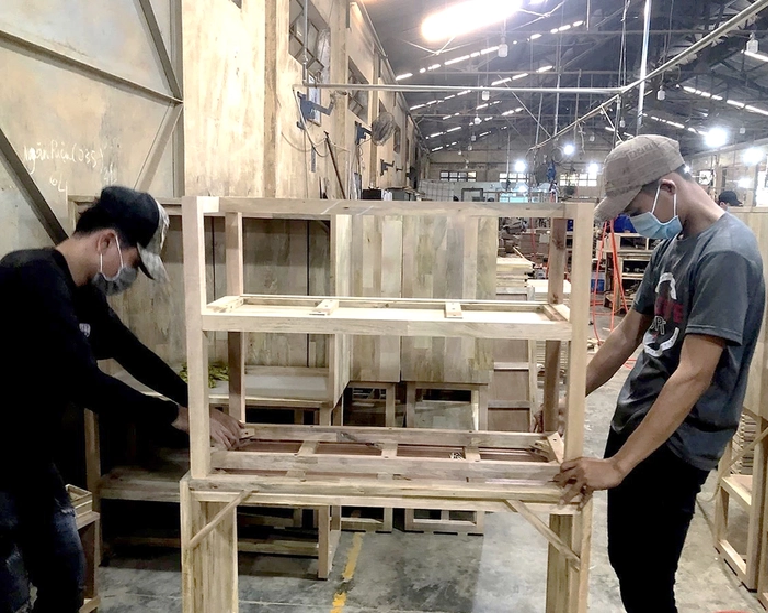After U.S. President Donald Trump said he would introduce 25-percent tariffs on autos, lumber, and forest products, Vietnamese enterprises in these sectors are concerned over the impact of the policy on their operations and export activities.
Vietnam’s auto sector is bracing for ripple effects from the tariff hike as global manufacturers seek alternative markets.
With a 25-percent import tax on cars entering the U.S. starting April 2, exporters will face levies 10 times higher than current rates for the EU and Japan (2.5 percent) and South Korea (0 percent), said Vu Tan Cong, former general secretary of the Vietnam Automobile Manufacturers’ Association.
Cong predicted that higher U.S. tariffs will reduce car imports into the American market, prompting manufacturers to shift their focus to emerging markets like Vietnam. This comes as Vietnam’s own import tariffs on cars are steadily declining.
Under the EU-Vietnam Free Trade Agreement, which took effect in 2020, import duties on EU-made vehicles will drop to zero by 2030, down from the current 35 percent.
Cars from Japan and South Korea that are produced or assembled in Vietnam or imported from ASEAN countries are also exempt from import taxes if they meet a 40-percent local content threshold.
Though Vietnam does not export cars to the U.S., Cong warned that these developments could shrink the country’s domestic manufacturing and assembly industry.
Some local assembly plants may be forced to shut down as global manufacturers restructure their production and distribution networks.
“Vietnam should create policies to encourage and support domestically produced and assembled cars and develop its auto support industry to better respond to the impact of the U.S. tariff policy and the changing strategies of car manufacturers,” Cong said.
Wood industry braces for U.S. tariffs
That President Trump is considering a 25-percent tariff on lumber and forest products, expected to take effect April 2, has raised alarm among Vietnamese wood exporters.
“If this policy comes into force, Vietnam’s wood production and export industry will be heavily impacted,” a local industry expert said.
Vietnam’s wood product exports to the U.S. totaled US$9.1 billion in 2024, accounting for nearly 56 percent of the country’s total wood exports.
The Southeast Asian country is the largest supplier of furniture and wooden products to the U.S..
The U.S. spent $53 billion on importing forest products, including wood, bamboo, paper, and related products, in 2024, said Do Ngoc Hung, commercial counselor and head of the Vietnamese Trade Office in the U.S..
Vietnam was the fifth-largest forest product exporter to the U.S..
Ngo Sy Hoai, vice-chairman and general secretary of the Vietnam Timber and Forest Product Association, emphasized the mutual benefits of the Vietnam-U.S. wood trade, noting that Vietnam is also the second-largest consumer of U.S. timber after China.
Oak, ash, hickory, walnut, and poplar imported from the U.S. are processed in Vietnam into high-value products, some of which are exported back to the American market.
Still, businesses must ensure compliance with strict traceability requirements for wood materials to maintain access to the U.S. market.
Lumber is a sensitive product in today’s green production and trade landscape and Vietnamese companies should strengthen their commitment to legal sourcing and transparency in supply chains.
Hoai also noted that local firms should improve trade defense skills so that they can effectively respond to challenges imposed by foreign markets.
Vietnam has traditionally grown by increasing its low-cost inputs and maintaining a reliance on inexpensive raw materials and labor.
With this strategy gradually fading away, it has become necessary for the country’s producers to shift from contract manufacturing to original design manufacturing.
Preparing for retaliatory tariffs
Vietnam’s wood exports to the U.S. have consistently grown in recent years, with wood products making up a significant share of the country’s forest product shipments.
If the U.S. imposes tariffs across the board, Vietnamese wood exporters could lose their competitive edge. However, the U.S. has yet to finalize the tariff structure.
Commercial counselor Hung pointed out that the U.S. has yet to announce the specific tariff rates or the effective date of the new tarrifs, indicating its caution and ongoing concerns about retaliatory tariffs.
Hung also noted that White House economic adviser Peter Navarro has acknowledged the need for further study before implementing the measures
The commercial counselor added that any retaliatory tariffs will likely be adjusted based on various factors, including existing tariffs imposed on the U.S., local tax policies, costs to American businesses and consumers, and foreign exchange practices.
Like us on Facebook or follow us on Twitter to get the latest news about Vietnam!




















































